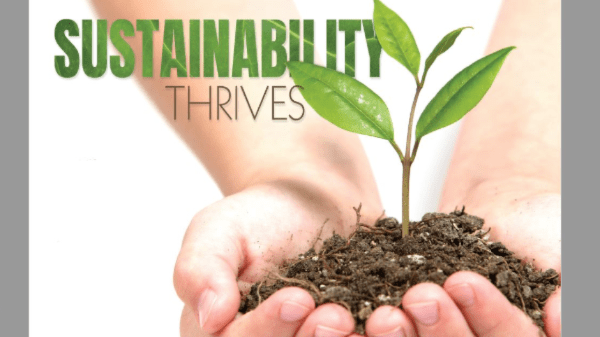Sustainability is here to stay.
Derided as a fringe concern not so long ago, it has entered the mainstream of American business—to stay there for the foreseeable future.
“Sustainability has gone beyond compliance and become a board level issue as consumers, governments and investors scrutinize the environmental record of businesses,” writes Diana Davis on Industrial Transformation Network.
Citing figures from Gartner, Davis continues, “85% of investors considered ESG factors as part of their investments in 2020.”
“ESG” stands for “environmental, social, and governance” issues—an acronym that will become increasingly familiar.


Results of a recent survey by Sensormatic confirms these conclusions. The survey indicated that 41 percent of consumers are “very concerned” and 40 percent are “concerned” about the future of the environment.
“Nearly 80% of shoppers indicated they consider sustainability for at least some of their purchases,” the report on the survey said, “and 50% said that their decision to make sustainable purchases is directly related to concern for the planet.”
What does “sustainability” mean here? A majority of people surveyed connected it with reducing waste, recycling, using ecofriendly fabric and materials, reducing emissions, and improving energy efficiency.
In retail, sustainability is connected with sustainable packaging, enhancing “inventory intelligence,” energy-efficient measures, and apparel recirculation.
Nevertheless, the report added, “Consumers are unlikely to participate in sustainability measures that are inconvenient—but they’ll do it for a reward,” such as discounts, replacements, and having convenient places to return used items.
In retail grocery, sustainability has heightened the impetus toward plant-based foods, sales of which reached $7.4 billion in 2021.
Dollar sales for plant-based milk have increased 33 percent over the past three years, and 4 percent in the past year. It now represents 16 percent of all retail milk sales, and “is the growth engine of the milk category.”
By contrast, plant-based meat sales stayed stable, with 2021 delivering a “repeat year of $1.4 billion in dollar sales.” This outpaced sales growth for conventional meat by almost three times. Sales of conventional meat increased 8 percent over the past three years, while those for plant-based meat grew 51 percent.
Standing back from these figures, one could conclude that plant-based milk will continue to increase in popularity and become a familiar presence on American refrigerator shelves.
Plant-based meats are a bigger question. They are more expensive than conventional meat, and their nutritional benefits are questionable. Plant-based meat is so heavily processed that it is hard to see it as “sustainable” except for the fact that it does not use actual meat.
Two likely possibilities here: (1) consumers will grasp these facts, and demand for plant-based meat will recede for the most part to the vegan/vegetarian market; (2) current plant-based meats are at an early stage of the product development process and will improve in nutritional quality and price competitiveness.
Organics too are now mainstream. Despite prices that run 10-30 percent higher than those of conventional items, organic fresh produce sales followed many years of growth with another 5.5 percent in 2021 over 2020, topping $9 billion for the first time.
In 2021, overall organic produce volume increased by 2 percent year over year, versus the –3.3 percent volume loss seen in conventional produce.
Some analysts see the slower growth in organic produce in 2021 than in 2020 as a sign that consumers are returning to pre-pandemic shopping trends. But because organic sales have still increased while conventional ones have decreased, this claim looks very much like jumping to conclusions.
At this point, it seems likely that inflation will affect organic produce purchases more than some knee-jerk return to a pre-Covid world.
Two main drivers of growth in organics are perceived greater safety and sustainability.
Possibly consumers will come to understand that the safety of organic produce is only minimally greater than that of its conventional equivalent. But their quest for sustainability is unlikely to go away.



